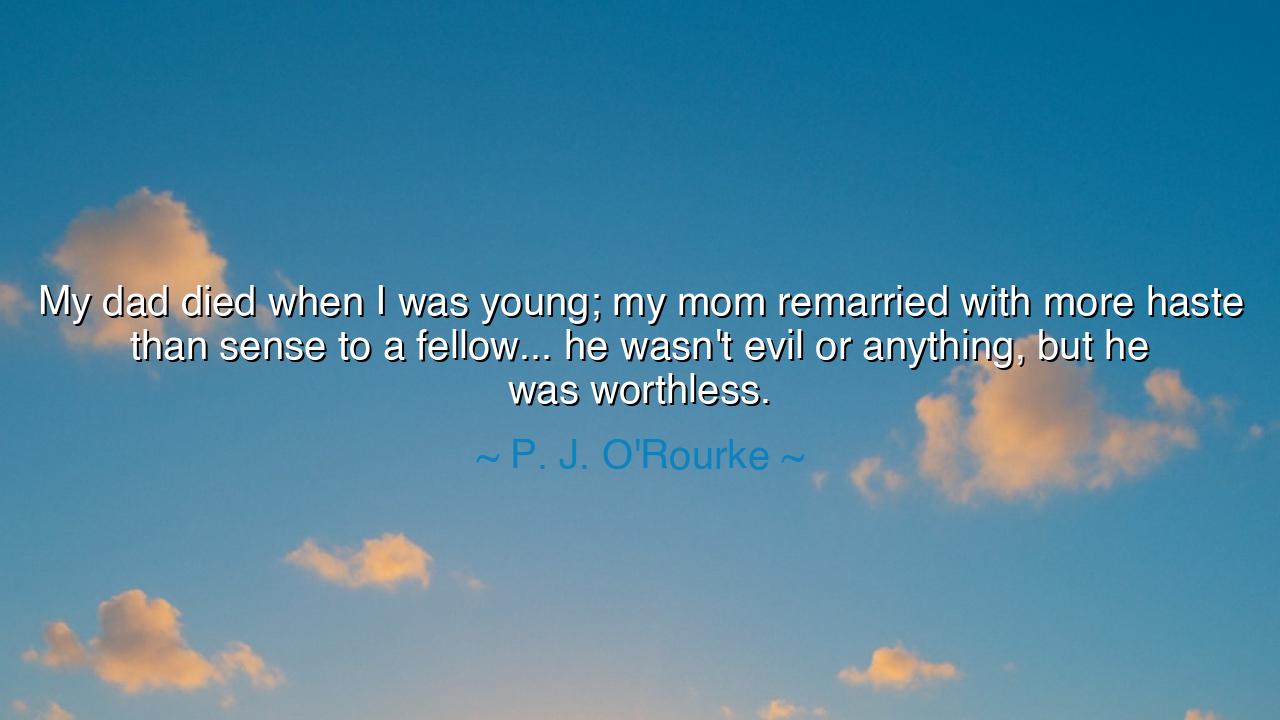
My dad died when I was young; my mom remarried with more haste
My dad died when I was young; my mom remarried with more haste than sense to a fellow... he wasn't evil or anything, but he was worthless.






“My dad died when I was young; my mom remarried with more haste than sense to a fellow... he wasn't evil or anything, but he was worthless.” Thus spoke P. J. O’Rourke, the sharp-tongued satirist whose humor often carried beneath it the quiet ache of truth. In this remembrance, half sorrow and half reflection, we hear not bitterness, but the wisdom that comes from having seen the imperfections of life and survived them. It is a tale as old as humanity itself—the story of loss, the longing for stability, and the painful lesson that not every choice made from loneliness or fear leads to healing.
When O’Rourke tells of his father’s death and his mother’s hasty remarriage, he is not condemning her; he is unveiling a truth about human frailty. In times of grief, we seek to fill the emptiness with something—someone—that promises safety. The heart in mourning becomes impatient, longing for comfort more than clarity. But such haste, as he gently observes, can lead not to renewal but to disappointment. The new man in their lives, though not evil, lacked purpose, conviction, and strength. He was not a villain—but he was worthless in the sense that he added no light, no structure, no wisdom to the lives he entered. And that is, perhaps, a tragedy greater than cruelty: to dwell among others and contribute nothing of value.
The origin of this insight lies not in cynicism, but in compassion. O’Rourke’s words remind us that goodness alone is not enough; to live meaningfully is to be useful, to stand for something, to shape the world with effort and integrity. There are those who never harm others, yet never help them either. They drift through life without vision, never lifting a hand to build, comfort, or guide. Such people, though harmless, leave behind a vacuum of purpose. In the eyes of the young O’Rourke, his stepfather’s worthlessness was not moral failure, but the failure to live deliberately, to rise to the sacred duty of being a steady presence in a fragile household.
History is filled with examples of those who understood the difference between mere goodness and true worth. Consider Marcus Aurelius, the philosopher-emperor of Rome. Though burdened with immense power, he never allowed himself to drift in comfort or idleness. His life was one of discipline, service, and reflection. He wrote, “Waste no more time arguing what a good man should be. Be one.” This is the very antidote to the kind of “worthlessness” O’Rourke describes. To be of worth is to act—to uphold duty, to bring strength where there is weakness, to bring calm where there is confusion.
In O’Rourke’s reflection, there is also a tender recognition of his mother’s humanity. She was not foolish in nature, only desperate in spirit. Her error was born not of malice, but of longing. Many, in their own grief or fear, have done likewise—reached for companionship before healing, mistaking proximity for love and comfort for security. This is a lesson the wise learn through pain: that not every presence fills the void; some merely occupy it. The young who watch such choices grow old faster than their years, learning that affection must never outrun discernment.
The lesson, then, is both personal and universal. It teaches us that in times of sorrow, we must be patient. The soil of grief must be given time to rest before new seeds are planted, or else nothing strong will grow. It teaches us, too, that to live well, one must strive not merely to avoid evil, but to cultivate worth—to become a source of strength and meaning for those we love. A harmless life is not the same as a good one; the good life is one that gives, uplifts, and leaves the world better than it was found.
So, my child, when life wounds you and loneliness tempts you to act quickly, remember the wisdom of P. J. O’Rourke’s words. Do not fill emptiness with haste. Let your choices ripen in reflection. Seek not just those who are kind, but those who are steady and purposeful. And in your own life, strive not only to be blameless, but to be of worth—to offer presence where others offer absence, to build where others merely rest. For in the end, the measure of a life is not found in its harmlessness, but in its usefulness, and the love and strength it leaves behind for others to inherit.






AAdministratorAdministrator
Welcome, honored guests. Please leave a comment, we will respond soon